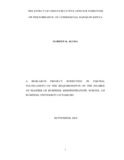The effect of chief executive officer turnover on performance of commercial banks in Kenya
| dc.contributor.author | Alusa, Doreen K | |
| dc.date.accessioned | 2016-04-20T13:04:45Z | |
| dc.date.available | 2016-04-20T13:04:45Z | |
| dc.date.issued | 2015 | |
| dc.identifier.uri | http://hdl.handle.net/11295/94414 | |
| dc.description.abstract | Employee turnover is the movement of people into and out of the organization. CEO turnover is the frequency with which CEOs are replaced over a given time period. Recently engaged employees are more likely to leave than long serving employees. Separations and their consequent replacement can be surprisingly expensive. Studies conclude that turnovers are often treated as dependent variables and the level of turnovers are higher in companies with low corporate performance. Longer CEO tenure may be associated with more control of the firm and greater influence on the board, thereby reducing the likelihood of forced CEO turnover. CEO entrenchment makes him dominate the board and consequently pursue costly pet projects and demand compensation packages that benefit them at the expense of shareholders. The objective of this study was to find out whether CEO turnover affects the performance of Commercial Banks in Kenya. The study adopted a descriptive cross-sectional research design. The population of the study was all the 43 Commercial Banks in Kenya and a census was carried out. Both primary and secondary data was collected and analysed using descriptive statistics and regression analysis. The results indicate that the relationship between CEO tenure and organizational performance is positive though the relationship is not very strong and not significant since the P value is greater than 0.05. R square, the Coefficient of Determination is 0.06 indicating that only 6% of turnover falls on the regression line. The overall F test for the null hypothesis is 1.9 indicating that there is evidence to reject the null hypothesis thus increased CEO turnover does not impact on Commercial Bank's performance. The findings of the study indicate that CEO turnover in commercial banks does not impact on the overall performance of the same institution. These results are inconsistent with other studies that document an inverse relation between the likelihood of Chief Executive Officer (CEO) turnover and firm performance. Other studies have concluded that this relationship is equivocal. The study concludes that performance of the firm reveals information about a CEO’s ability to create value for shareholders. The researcher recommends that Commercial banks should review their policies on CEO tenure and turnover and align them to the interests of the shareholders. | en_US |
| dc.language.iso | en | en_US |
| dc.publisher | University of Nairobi | en_US |
| dc.subject | effect of chief executive officer turnover on performance | en_US |
| dc.title | The effect of chief executive officer turnover on performance of commercial banks in Kenya | en_US |
| dc.type | Thesis | en_US |

